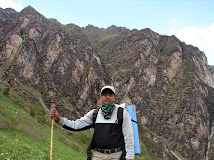 Nepal Academy of Science and Technology (NAST) is losing its most vital resource, scientific minds, to institutions at home and abroad.
Nepal Academy of Science and Technology (NAST) is losing its most vital resource, scientific minds, to institutions at home and abroad. According to a scientist at NAST, over 50 scientists, engineers and nearly 100 other brilliant researchers have quit NAST to go abroad or join private research institutions within the country
during the last decade.
during the last decade.
"Given the present context of lesser government priority for science and technology, over 50 scientists and 100 other researchers left the academy during the last 10 years," says Deepak Raj Poudel, chief of Promotion Division at NAST, "And we have failed to stop the increasing brain drain in not providing financial incentives and other facilities needed for research work."
A few of the scientists who held permanent tenure at NAST before migrating out are doing better at foreign research institutes that no doubt provide them better facilities and perks.
A few of the scientists who held permanent tenure at NAST before migrating out are doing better at foreign research institutes that no doubt provide them better facilities and perks.
According to Poudel, Dr Raju Adhikari, a senior chemist, is now working at a research institution in Australia; Dr Bharat Basyal is working in the United States; Dr Bhim Bahadur Bon, a research fellow in radiation, is in Italy; and Dr Sushil Wagle, research scientist, in also in the US, to name a few. Likewise, among the engineers, Kedar Adhikari left for Thailand, Suman Bhakta Mathema is now in Australia, Anil Adhikari is in the US and Lokendra Bahadur Keshari in Sri Lanka.
Besides this, some of the scientists have also shifted to private research institutes within the country. Dr Trinatra Pradhananga, principal of the private college National Institute of Science and Technology in Patan and Dr Madhav Prasad Baral, principal at NIST Lainchaur, are just some of the noted ones.
"Most of the scientists leave NAST citing an unfavorable environment for research work," says former NAST scientist Dr Pradhananga, adding, "As long as the necessary facilities are not provided, the brain drain will continue. But for me, brain drain is not a bad thing in this age of globalization."
Acting against government regulations, some of the scientists resigned after going abroad while some who went for training did not return. "Until and unless NAST provides financial incentives, the brain drain will be here to stay," reasons Ramila Raut, a senior promotion officer working at NAST since the last 23 years.
Adding to existing woes, some of the scientists at NAST take month-long leaves and work for various research projects outside. "We cannot reveal their names, and maybe it's also a compulsion for them to cope with their financial needs," says Poudel. "The trend is bad, with most of the junior scientists and research fellows going aboard after making their profile at NAST.
"It's natural to migrate to other countries in search of more opportunities as the country has not been giving even minimum attention to this sector. Sometimes, we feel happy to see them doing their highly appreciated work," says senior scientist Dr Chiranjivi Regmi, division chief of science section at NAST.
The Ministry of Environment, Science and Technology has no programs to stop the outward movement. "Agreed, the government cannot remain passive to the ongoing brain drain, but the country's current priority lies in conflict related areas," says Lok Hari Pandey, under-secretary and assistant spokesperson at the ministry. "As always we receive complaints from scientists at NAST over meager salary, but right now we are not in a position to increase their salaries."
With a tight yearly budget of Rs 50.41 million, only a little money remains for scientific research, with a large chunk of the money going to administration activities.
"The government should seriously address the problem by sorting out such problems," says scientist Regmi.




+Researcher+from+the+Himalayas).jpg)


No comments:
Post a Comment